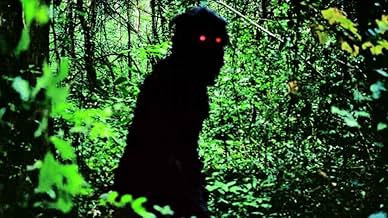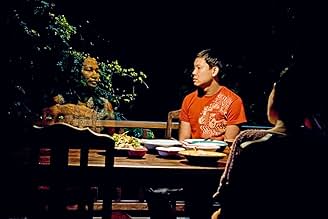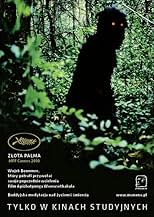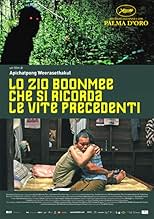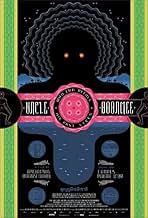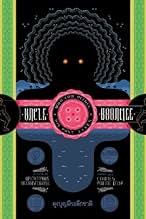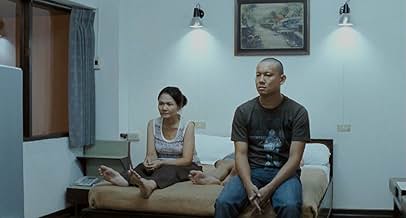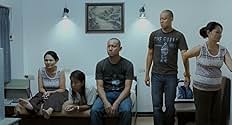Oncle Boonmee (celui qui se souvient de ses vies antérieures)
Original title: Loong Boonmee raleuk chat
- 2010
- Tous publics
- 1h 54m
IMDb RATING
6.7/10
18K
YOUR RATING
Dying of kidney disease, a man spends his last, somber days with family, including the ghost of his wife and a forest spirit who used to be his son, on a rural northern Thailand farm.Dying of kidney disease, a man spends his last, somber days with family, including the ghost of his wife and a forest spirit who used to be his son, on a rural northern Thailand farm.Dying of kidney disease, a man spends his last, somber days with family, including the ghost of his wife and a forest spirit who used to be his son, on a rural northern Thailand farm.
- Director
- Writers
- Stars
- Awards
- 11 wins & 25 nominations total
Kanokporn Tongaram
- Roong
- (as Kanokporn Thongaram)
- …
- Director
- Writers
- All cast & crew
- Production, box office & more at IMDbPro
Featured reviews
In order to appreciates the film, you have to understand that this movie is not just a normal film where you can expects classical narrative and plot. the directer not only have Buddhism as a philosophical point of view but he also put a little bit of Thai historical and political aspects in to the film.
In my opinion, the theme of this film is the man's struggle from human condition and transformation.
here are some few points I'd like to make concerning the film:
1. Man and Illusion
Before humankind, there was nature, which is pure and true. there are trees and wind and animals and so on. then there are man, which is basically another living specie. both animal and human have the same drive (sex, food, shelter etc.) the only different between man and animal is the ability to understand "sign" (read semiotic for more understanding) thus, human being created language, painting and symbol and so on. in other word, because our brain can perceived sign, so we can created ART. Art was created by man since the days of the cave man i.e. cave painting in Lascaux, France. (did you noticed that there are also cave paintings in the film?)
Man are proud that we are the only specie that can create and appreciate art, but what we didn't realized is that we are also the only specie that have the ability the created the illusion/lie/falsehood. Because of evolution, our unique brain can store memories and emotion, mix it up, and then created stuffs from it. because of this, the more time pass, the more we are far away from the truth; culture, law, politic, social status etc. are all MAN-MADE ILLUSION
2. Illusion of Dualism
It's seems like our perceived reality of "duality in nature" is embedded in our brain. we separated things into yin/yang mentality: day/night, good/bad, man/woman, live/death. one scene in particular shows how Boonmee kill the worms in his tamarind tree because "it's pest". then the next scene he show his sister the bee hive and seems very protective of it (he explain to his sister to avoid the larvae area on the plate). When he told his sister that his condition is the result of his karma from killing COMMUNIST and PEST, his sister replied "it's alright because you have good intention". When did killing other being can become good intention? Aren't communist human too? Aren't pests and bees are both insects?
3. The role of photography/Film, Memories, and Reality
Roland Barthes, in his book "Camera Lucinda", explained that a picture creates a falseness in the illusion of 'what is', where 'what was' would be a more accurate description. We can see a lot of scene involved photography; from the photos Boonmee shows to his dead wife as a proof of her funeral, the obsession of his son before he became a monkey, the final scene which Boonmee told the story about his dream etc. (this is an important scene, we will talk about it later)
4. In the playground, we created the rules, then we fought each other
In the film, we see peoples who of separated by this so-called man-made illusion, for example, different nationalities and spoken languages (Thai vs Laos), (Laos vs French) (Isan vs. Central Thai) etc. If you know little bit about Thai history, you will understand that the director also talk about the official vs the people / communism vs democracy(?).
in the final scene where Boonmee told the story about his dream, we see people wearing uniform. They are obviously appointed as "Soldier/Army". Then in the next photo we saw these soldiers captured the Monkeys Ghost. If you watch the film until this point, by now you should realized that the Monkey ghost is the allegory of the Communist.
then in the next photo, we saw that the soldier now taking their clothes off and play other kind of war game (throwing rock). The most funny thing is in the last photo, we saw 2 circles draw on the ground. In my opinion, the director suggest that countries, border dispute and war are nothing but a child's game.
5. Jāti: literally birth, but life is understood as starting at conception
the word "ชาติ" in Thai word derived from Sanskrit "Jāti", when translated to English it simply means "live". hence the name of the film "Uncle Boonmee who can recall his past lives" but in fact, the word Jati is the term in Buddhism which is not simply translate as "live" but have a lot more profound meaning.
By the way, I have the same feeling watching this film and Kubrick's 2001: Space Odyssey. Maybe because it also dealt with the theme of human condition and transformation, but this film is from the Eastern Philosophy point of view, of course.
In my opinion, the theme of this film is the man's struggle from human condition and transformation.
here are some few points I'd like to make concerning the film:
1. Man and Illusion
Before humankind, there was nature, which is pure and true. there are trees and wind and animals and so on. then there are man, which is basically another living specie. both animal and human have the same drive (sex, food, shelter etc.) the only different between man and animal is the ability to understand "sign" (read semiotic for more understanding) thus, human being created language, painting and symbol and so on. in other word, because our brain can perceived sign, so we can created ART. Art was created by man since the days of the cave man i.e. cave painting in Lascaux, France. (did you noticed that there are also cave paintings in the film?)
Man are proud that we are the only specie that can create and appreciate art, but what we didn't realized is that we are also the only specie that have the ability the created the illusion/lie/falsehood. Because of evolution, our unique brain can store memories and emotion, mix it up, and then created stuffs from it. because of this, the more time pass, the more we are far away from the truth; culture, law, politic, social status etc. are all MAN-MADE ILLUSION
2. Illusion of Dualism
It's seems like our perceived reality of "duality in nature" is embedded in our brain. we separated things into yin/yang mentality: day/night, good/bad, man/woman, live/death. one scene in particular shows how Boonmee kill the worms in his tamarind tree because "it's pest". then the next scene he show his sister the bee hive and seems very protective of it (he explain to his sister to avoid the larvae area on the plate). When he told his sister that his condition is the result of his karma from killing COMMUNIST and PEST, his sister replied "it's alright because you have good intention". When did killing other being can become good intention? Aren't communist human too? Aren't pests and bees are both insects?
3. The role of photography/Film, Memories, and Reality
Roland Barthes, in his book "Camera Lucinda", explained that a picture creates a falseness in the illusion of 'what is', where 'what was' would be a more accurate description. We can see a lot of scene involved photography; from the photos Boonmee shows to his dead wife as a proof of her funeral, the obsession of his son before he became a monkey, the final scene which Boonmee told the story about his dream etc. (this is an important scene, we will talk about it later)
4. In the playground, we created the rules, then we fought each other
In the film, we see peoples who of separated by this so-called man-made illusion, for example, different nationalities and spoken languages (Thai vs Laos), (Laos vs French) (Isan vs. Central Thai) etc. If you know little bit about Thai history, you will understand that the director also talk about the official vs the people / communism vs democracy(?).
in the final scene where Boonmee told the story about his dream, we see people wearing uniform. They are obviously appointed as "Soldier/Army". Then in the next photo we saw these soldiers captured the Monkeys Ghost. If you watch the film until this point, by now you should realized that the Monkey ghost is the allegory of the Communist.
then in the next photo, we saw that the soldier now taking their clothes off and play other kind of war game (throwing rock). The most funny thing is in the last photo, we saw 2 circles draw on the ground. In my opinion, the director suggest that countries, border dispute and war are nothing but a child's game.
5. Jāti: literally birth, but life is understood as starting at conception
the word "ชาติ" in Thai word derived from Sanskrit "Jāti", when translated to English it simply means "live". hence the name of the film "Uncle Boonmee who can recall his past lives" but in fact, the word Jati is the term in Buddhism which is not simply translate as "live" but have a lot more profound meaning.
By the way, I have the same feeling watching this film and Kubrick's 2001: Space Odyssey. Maybe because it also dealt with the theme of human condition and transformation, but this film is from the Eastern Philosophy point of view, of course.
For those who have not heard of Thai filmmaker and artist Apichatpong Weerasethakul, I guess you must have heard of his latest film Uncle Boonmee Who Can Recall His Past Lives, winning the Palme d'Or at last year's Cannes Film Festival, and being the first Southeast Asian director to do so. That should interest you to take that leap of faith to experience the coming of Uncle Boonmee yourself, and that feeling of being frustrated yet enthralled, fascinated yet perplexed, all at the same time, fighting to stay engaged, and making sense of the visuals flitting around dreamscapes.
This film is like a diamond with many different cuts made to make it shine, each representing a facet from which you can choose to look at, or interpret from. Like a prism which dissipates light shone on it, your take on this film will likely be entirely different from mine, and what more, you'll probably have different takes on each of the different aspects of the film, since the scenes that make it up are as disparate as can be. It makes the film going experience a little more interesting since it's open, and never crystal clear given the takeaways for one based on one's journey in life thus far.
At its crux, the story is exactly that of its title, where we see Uncle Boonmee (Thanapat Saisaymar) living the last days of his life with kidney failure, choosing like most Asians do with the preference to live out the last days at the comfort of one's home, rather than at a sterile hospital. It is said that those on the death bed will see their life flash pass their eyes, but for Uncle Boonmee, his plodding walk toward the light at the end of the tunnel, means giving the film a lot more exploratory path to tread on, with a look at what his past lives were as well, ranging from the suggested buffalo, to even a member of the aristocracy (and that much talked about scene with the catfish. Hmm... maybe he could be the catfish too!)
Things get a lot stranger of course, even as it seems that Boonmee can remember his previous lives before reincarnation. As far as my limited grasp of that process goes, one has to drink up a liquid that will make you forget what you've gone through, and one's karma accumulation has bearings on what next you'll be incarnated, with the human form being quite OK, rather than an animal. I suppose Boonmee in his previous life did OK to be reincarnated as a human in this life, and in his last days get visited by his late wife (Natthakarn Aphaiwonk) with whom he shares a poignant, heart-wrenching scene with, and also a visit from his son (Geerasak Kulhong behind heavy makeup), whom you'd have already have an idea of from the various promotional material, and no, he's not captured in a picture just because the camera did not have an anti-red eye function.
Don't be shy if you don't understand the film. For starters, I suppose any film based on dreams and fantasy opens itself up to a lot of leeway in interpretation, and not taking everything verbatim, verbose or literal. Even the auteur himself has said that you "don't need to understand everything" in an interview with The Guardian, probably a relief for those like me who emerged from the screening with more questions than to know where to begin asking them. Like most art films, this one moves at a leisurely pace, and is filled with plenty of art house sensibilities and techniques, and while I won't say will reward the patient viewer, it will challenge you to think through about what you've just seen, and I felt it was easier to make sense of individual scenes, than as a whole when trying to fit the jigsaw in a coherent fashion.
To paraphrase Bruce Lee, this film is like water, having no form of its own, yet taking up form based on the viewer's individual experience and interpretation. I guess that's what makes Uncle Boonmee unique, coming from a filmmaker who's bold to conceptualize this piece of art that works itself through different strokes for different folks.
This film is like a diamond with many different cuts made to make it shine, each representing a facet from which you can choose to look at, or interpret from. Like a prism which dissipates light shone on it, your take on this film will likely be entirely different from mine, and what more, you'll probably have different takes on each of the different aspects of the film, since the scenes that make it up are as disparate as can be. It makes the film going experience a little more interesting since it's open, and never crystal clear given the takeaways for one based on one's journey in life thus far.
At its crux, the story is exactly that of its title, where we see Uncle Boonmee (Thanapat Saisaymar) living the last days of his life with kidney failure, choosing like most Asians do with the preference to live out the last days at the comfort of one's home, rather than at a sterile hospital. It is said that those on the death bed will see their life flash pass their eyes, but for Uncle Boonmee, his plodding walk toward the light at the end of the tunnel, means giving the film a lot more exploratory path to tread on, with a look at what his past lives were as well, ranging from the suggested buffalo, to even a member of the aristocracy (and that much talked about scene with the catfish. Hmm... maybe he could be the catfish too!)
Things get a lot stranger of course, even as it seems that Boonmee can remember his previous lives before reincarnation. As far as my limited grasp of that process goes, one has to drink up a liquid that will make you forget what you've gone through, and one's karma accumulation has bearings on what next you'll be incarnated, with the human form being quite OK, rather than an animal. I suppose Boonmee in his previous life did OK to be reincarnated as a human in this life, and in his last days get visited by his late wife (Natthakarn Aphaiwonk) with whom he shares a poignant, heart-wrenching scene with, and also a visit from his son (Geerasak Kulhong behind heavy makeup), whom you'd have already have an idea of from the various promotional material, and no, he's not captured in a picture just because the camera did not have an anti-red eye function.
Don't be shy if you don't understand the film. For starters, I suppose any film based on dreams and fantasy opens itself up to a lot of leeway in interpretation, and not taking everything verbatim, verbose or literal. Even the auteur himself has said that you "don't need to understand everything" in an interview with The Guardian, probably a relief for those like me who emerged from the screening with more questions than to know where to begin asking them. Like most art films, this one moves at a leisurely pace, and is filled with plenty of art house sensibilities and techniques, and while I won't say will reward the patient viewer, it will challenge you to think through about what you've just seen, and I felt it was easier to make sense of individual scenes, than as a whole when trying to fit the jigsaw in a coherent fashion.
To paraphrase Bruce Lee, this film is like water, having no form of its own, yet taking up form based on the viewer's individual experience and interpretation. I guess that's what makes Uncle Boonmee unique, coming from a filmmaker who's bold to conceptualize this piece of art that works itself through different strokes for different folks.
I just finished watching this movie for the second time. I saw it twice because I was torn between making the decision of whether it was absolute garbage, or a work of genius. It's pretty much garbage. Sorry.
Picture this: you download some pictures of Thai forests and caves from National Geographic. You then download "Forest Sounds Vol. 2". You play a slide-show of these pictures whilst listening to the ominous and atmospheric sounds of the jungle. After about 10 minutes, you stop what you're doing and sit in a corner for an hour and a half. Then, you go back to your slide-show and sound effects for another 10 minutes. This is the movie in a nutshell.
There are some beautiful shots within the movie, and it's obvious there was some talent because they make a point to keep these still shots on the screen for as long as possible. The background sounds add a lot to the movie as well, but everything else was just plain bad. All of the acting was quiet and monotonous, and it didn't make it seem more natural at all.
The dialogue was terrible. Nothing made sense. As much as I would love to be even more pretentious about movies than I already am, and rave about how people don't understand this movie, there actually is really nothing to understand. All of the characters were the same. Any subtleties within them are just projections of the viewer filling in the blanks, and believe me, they are blank.
The majority of the movie was filler.
Garbage.
Picture this: you download some pictures of Thai forests and caves from National Geographic. You then download "Forest Sounds Vol. 2". You play a slide-show of these pictures whilst listening to the ominous and atmospheric sounds of the jungle. After about 10 minutes, you stop what you're doing and sit in a corner for an hour and a half. Then, you go back to your slide-show and sound effects for another 10 minutes. This is the movie in a nutshell.
There are some beautiful shots within the movie, and it's obvious there was some talent because they make a point to keep these still shots on the screen for as long as possible. The background sounds add a lot to the movie as well, but everything else was just plain bad. All of the acting was quiet and monotonous, and it didn't make it seem more natural at all.
The dialogue was terrible. Nothing made sense. As much as I would love to be even more pretentious about movies than I already am, and rave about how people don't understand this movie, there actually is really nothing to understand. All of the characters were the same. Any subtleties within them are just projections of the viewer filling in the blanks, and believe me, they are blank.
The majority of the movie was filler.
Garbage.
I really do wish I could like this. As it is, I think it has some dazzling sequences, and some really atmospheric and hypnotizing scenes. For the most part though, it didn't amount to much for me, and that's because I was just really bored by a lot of it. This really just comes down to whether one is hypnotized or bored by it, and unfortunately for me it was the latter. That doesn't mean that it's an awful film, it has way too much originality in what I saw to label it as such (and whether it has anything to really say is anyone's guess). Still, I wouldn't recommend this to most people, simply because it's so hard to get into. Not recommended.
Incoherent, unpredictable, mystical, yet undoubtedly original, "Uncle Boonmee Who Call Recall His Past Lives" is a pseudo-profound cinematic venture that reeks with allegory and mythical undertones. After watching this film, I've come to a conclusion that it is certainly not for everyone.
Despite its strange recurring themes about supernatural beings, spirits, Buddhist philosophy, karma, and reincarnation, it will bathe you with its gentleness and natural ornateness. It is intimate and surprisingly elegant, though not without its flaws.
Much like Terrence Malick's "Tree of Life," this motion picture lacks a linear narrative. It doesn't have what most of us would require from a movie: a plot. It heavily relies on hypnotic images captured into still wide frames that often drag longer than the easily-bored viewer can bear.
Then there's the noticeable absence of a musical score. You never get to hear music until the last few minutes of the film; all you'll hear besides the dialogues are crickets, the rustling of leaves, a water buffalo, the sound of an electric fly swatter zapping flying bugs, footsteps, a waterfall, and a talking catfish that made love to a disfigured princess.
Simple and ambitious; primitive and modern; eerie and comforting; senseless and driven; and dull and brilliant, this Thai film gives you a one-of-a-kind viewing experience. If you are into esoteric art films, this is something I would highly recommend. If you loathe movies that seem to have no meaning, then this is not for you.
Confounding as it is, "Uncle Boonmee..." is a film that doesn't need to be understood; it simply has to be FELT.
Despite its strange recurring themes about supernatural beings, spirits, Buddhist philosophy, karma, and reincarnation, it will bathe you with its gentleness and natural ornateness. It is intimate and surprisingly elegant, though not without its flaws.
Much like Terrence Malick's "Tree of Life," this motion picture lacks a linear narrative. It doesn't have what most of us would require from a movie: a plot. It heavily relies on hypnotic images captured into still wide frames that often drag longer than the easily-bored viewer can bear.
Then there's the noticeable absence of a musical score. You never get to hear music until the last few minutes of the film; all you'll hear besides the dialogues are crickets, the rustling of leaves, a water buffalo, the sound of an electric fly swatter zapping flying bugs, footsteps, a waterfall, and a talking catfish that made love to a disfigured princess.
Simple and ambitious; primitive and modern; eerie and comforting; senseless and driven; and dull and brilliant, this Thai film gives you a one-of-a-kind viewing experience. If you are into esoteric art films, this is something I would highly recommend. If you loathe movies that seem to have no meaning, then this is not for you.
Confounding as it is, "Uncle Boonmee..." is a film that doesn't need to be understood; it simply has to be FELT.
Did you know
- TriviaShot on 16mm film rather than digital. Director Apichatpong Weerasethakul wanted to film in this format as the film is all about dying traditions.
- GoofsThe first time a ghost appears, during dinner, the nephew passes the ghost a glass of water. You can see the ghost image superimposed over the nephew's arm when he places the glass of water on the table.
- ConnectionsFeatured in At the Movies: Cannes Film Festival 2010 (2010)
- How long is Uncle Boonmee Who Can Recall His Past Lives?Powered by Alexa
Details
- Release date
- Countries of origin
- Official sites
- Languages
- Also known as
- Uncle Boonmee Who Can Recall His Past Lives
- Filming locations
- Production companies
- See more company credits at IMDbPro
Box office
- Gross US & Canada
- $184,292
- Opening weekend US & Canada
- $23,540
- Mar 6, 2011
- Gross worldwide
- $1,214,424
- Runtime
- 1h 54m(114 min)
- Color
- Sound mix
- Aspect ratio
- 1.85 : 1
Contribute to this page
Suggest an edit or add missing content


